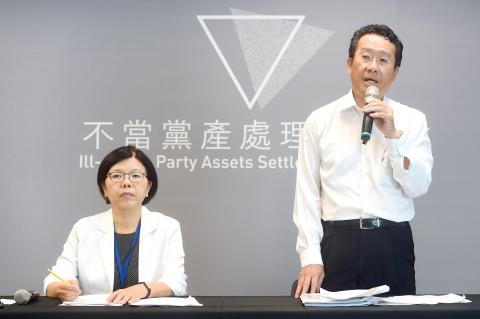The Ill-gotten Party Assets Settlement Committee yesterday said it froze a bank account of the Chinese Nationalist Party (KMT) over the issuance of 10 checks worth a collective NT$520 million (US$16.54 million) immediately after a law was promulgated prohibiting political parties from disposing of assets presumed to have been obtained illegally.
Following the implementation on Aug. 10 of the Act Governing the Handling of Ill-gotten Properties by Political Parties and Their Affiliate Organizations (政黨及其附隨組織不當取得財產處理條例), the KMT on Aug. 11 withdrew NT$520 million from Bank SinoPac (永豐銀行) and asked Bank of Taiwan (臺灣銀行) to issue 10 checks worth NT$52 million each, reportedly to pay for party expenses and employees’ salaries, committee spokeswoman Shih Chin-fang (施錦芳) said.
One check was cashed on Aug. 30, and funds were transferred to about 200 accounts, which might constitute a violation of the act, because the money is presumed to have been gained through illegal means and cannot be disposed of, Shih said.

Photo: Chien Jung-fong, Taipei Times
“The committee has asked SinoPac to freeze the KMT’s account, making it deposit-only,” committee Chairman Wellington Koo (顧立雄) said.
“Bank of Taiwan has been asked to place the nine uncashed checks on hold, in case anyone attempts to cash them,” Koo said.
If the cashed check was used to pay party employees’ salaries, the committee would ask the KMT, not the recipients, to return the money, Koo said.
Money in the SinoPac account is presumed to be ill-gotten, as the committee estimates that the KMT’s legitimate assets are worth about NT$630 million and its ill-gotten assets are worth NT$1.932 billion, while a total of NT$2.385 billion has been withdrawn from the account, Koo said.
Shih said the committee is to relaunch a Web site with the results of an investigation into ill-gotten party assets.
The Web site, launched in 2002 by the administration of former president Chen Shui-bian (陳水扁), was used to publish data gathered by an investigation between 2002 and 2007, but it was shut down in 2008 when former president Ma Ying-jeou (馬英九) took office.
“The committee decided to relaunch the Web site, because such data should be available to the public in a democratic nation such as Taiwan,” Shih said.
The committee is to hold a hearing to determine whether two holding companies — Central Investment Co (中央投資公司) and Hsinyutai Co (欣裕台股份有限公司) — are KMT affiliate organizations, if the two companies’ five shareholders are KMT trustees and whether their shares should be transferred to the state.
KMT Chairwoman Hung Hsiu-chu (洪秀柱) said the party is legally required to pay employees salaries and pensions, but the government is preventing it from meeting such a requirement.
“It is a shame that instead of doing what is necessary, the government has launched a political vendetta with no regard of the law,” Hung said, adding that all of the KMT’s assets are legitimate.
The KMT does not rule out the possibility of initiating protests, in addition to taking legal action, Hung said.

AIR SUPPORT: The Ministry of National Defense thanked the US for the delivery, adding that it was an indicator of the White House’s commitment to the Taiwan Relations Act Deputy Minister of National Defense Po Horng-huei (柏鴻輝) and Representative to the US Alexander Yui on Friday attended a delivery ceremony for the first of Taiwan’s long-awaited 66 F-16C/D Block 70 jets at a Lockheed Martin Corp factory in Greenville, South Carolina. “We are so proud to be the global home of the F-16 and to support Taiwan’s air defense capabilities,” US Representative William Timmons wrote on X, alongside a photograph of Taiwanese and US officials at the event. The F-16C/D Block 70 jets Taiwan ordered have the same capabilities as aircraft that had been upgraded to F-16Vs. The batch of Lockheed Martin

GRIDLOCK: The National Fire Agency’s Special Search and Rescue team is on standby to travel to the countries to help out with the rescue effort A powerful earthquake rocked Myanmar and neighboring Thailand yesterday, killing at least three people in Bangkok and burying dozens when a high-rise building under construction collapsed. Footage shared on social media from Myanmar’s second-largest city showed widespread destruction, raising fears that many were trapped under the rubble or killed. The magnitude 7.7 earthquake, with an epicenter near Mandalay in Myanmar, struck at midday and was followed by a strong magnitude 6.4 aftershock. The extent of death, injury and destruction — especially in Myanmar, which is embroiled in a civil war and where information is tightly controlled at the best of times —

China's military today said it began joint army, navy and rocket force exercises around Taiwan to "serve as a stern warning and powerful deterrent against Taiwanese independence," calling President William Lai (賴清德) a "parasite." The exercises come after Lai called Beijing a "foreign hostile force" last month. More than 10 Chinese military ships approached close to Taiwan's 24 nautical mile (44.4km) contiguous zone this morning and Taiwan sent its own warships to respond, two senior Taiwanese officials said. Taiwan has not yet detected any live fire by the Chinese military so far, one of the officials said. The drills took place after US Secretary

THUGGISH BEHAVIOR: Encouraging people to report independence supporters is another intimidation tactic that threatens cross-strait peace, the state department said China setting up an online system for reporting “Taiwanese independence” advocates is an “irresponsible and reprehensible” act, a US government spokesperson said on Friday. “China’s call for private individuals to report on alleged ‘persecution or suppression’ by supposed ‘Taiwan independence henchmen and accomplices’ is irresponsible and reprehensible,” an unnamed US Department of State spokesperson told the Central News Agency in an e-mail. The move is part of Beijing’s “intimidation campaign” against Taiwan and its supporters, and is “threatening free speech around the world, destabilizing the Indo-Pacific region, and deliberately eroding the cross-strait status quo,” the spokesperson said. The Chinese Communist Party’s “threats